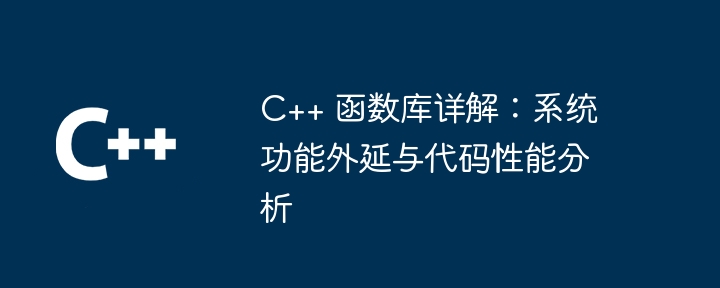
Answer: C function libraries enhance program functionality and optimize code performance. Details: System function extension: The function library provides pre-implemented functions such as containers, algorithms, and GUI tools. Code Profiling: Performance profiling tools identify areas in library calls where time is being spent. Code Optimization: Optimization techniques such as inlining and copy avoidance can improve the performance of library code. Practical case: STL containers are used for digital storage, Boost threads are used for thread management, and optimized code can be achieved by inlining functions and avoiding copying.

Detailed explanation of C function library: system function extension and code performance analysis
Introduction
C function library is a powerful tool that can greatly enhance the functionality of C programs and simplify the development process. This article will delve into the C function library, focusing on its system function extension and code performance analysis.
System function extension
The function library can expand the functions of C and provide developers with new functions without manual implementation. The following are some commonly used function libraries:
Code performance analysis
Function libraries can significantly affect code performance. Here are some ways to analyze and optimize the performance impact of library usage:
Practical case
Case 1: Using STL container
The following code uses the STL vector container to store a list of numbers :
#include <vector>
int main() {
std::vector<int> numbers = {1, 2, 3, 4, 5};
// 代码示例
return 0;
}Case 2: Using Boost thread
The following code uses Boost.Thread to create and manage threads:
#include <boost/thread.hpp>
void thread_function() {
// 线程要执行的代码
}
int main() {
boost::thread thread_obj(&thread_function);
// 代码示例
return 0;
}Case 3: Code performance optimization
The following code optimizes the use of function libraries by using inline functions and avoiding unnecessary string copying:
// 未优化版本
std::string get_full_name(const std::string& first_name, const std::string& last_name) {
std::string output;
output += first_name;
output += " ";
output += last_name;
return output;
}
// 优化版本
inline std::string get_full_name(const std::string& first_name, const std::string& last_name) {
return first_name + " " + last_name;
}Summary
C function libraries are powerful tools that can be used to extend system functionality and enhance code performance. By using code profiling, benchmarking, and code optimization techniques, developers can take full advantage of what libraries have to offer while minimizing performance overhead.
The above is the detailed content of Detailed explanation of C++ function library: system function extension and code performance analysis. For more information, please follow other related articles on the PHP Chinese website!
 Zero-based Java self-study tutorial
Zero-based Java self-study tutorial
 What are the differences between c++ and c language
What are the differences between c++ and c language
 Recommended learning order for c++ and python
Recommended learning order for c++ and python
 Cost-effectiveness analysis of learning python and c++
Cost-effectiveness analysis of learning python and c++
 Is c language the same as c++?
Is c language the same as c++?
 Which is better to learn first, c language or c++?
Which is better to learn first, c language or c++?
 The difference and connection between c language and c++
The difference and connection between c language and c++
 C++ software Chinese change tutorial
C++ software Chinese change tutorial




